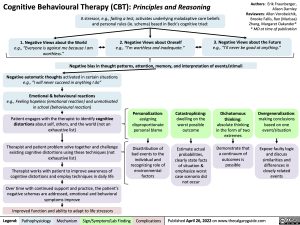Cognitive Behavioural Therapy (CBT): Principles and Reasoning
A stressor, e.g., failing a test, activates underlying maladaptive core beliefs
and personal rules (ie. schema) based in Beck’s cognitive triad:
1. Negative Views about the World 2. Negative Views about Oneself
e.g., “Everyone is against me because I am e.g., “I’m worthless and inadequate.” worthless.”
Authors: Erik Fraunberger, Alison Darnley Reviewers: Allen Vorobeichik, Brooke Fallis, Ran (Marissa) Zhang, Margaret Oakander* * MD at time of publication
3. Negative Views about the Future
e.g., “I’ll never be good at anything.”
Negative bias in thought patterns, attention, memory, and interpretation of events/stimuli
Negative automatic thoughts activated in certain situations e.g., ”I will never succeed in anything I do”
Emotional & behavioural reactions
e.g., Feeling hopeless (emotional reaction) and unmotivated in school (behavioural reaction)
Patient engages with the therapist to identify cognitive distortions about self, others, and the world (not an exhaustive list)
Therapist and patient problem solve together and challenge existing cognitive distortions using these techniques (not exhaustive list)
Therapist works with patient to improve awareness of cognitive distortions and employ techniques in daily life
Over time with continued support and practice, the patient’s negative schemas are addressed, emotional and behavioral symptoms improve
Personalization: assigning disproportionate personal blame
Disattribution of bad events to the individual and recognizing role of environmental factors
Catastrophizing:
dwelling on the worst possible outcome
Estimate actual probabilities, clearly state facts of situation & emphasize worst case scenario did not occur
Dichotomous thinking: absolute thinking in the form of two extremes
Demonstrate that a continuum of outcomes is possible
Overgeneralization: making conclusions based on one event/situation
Expose faulty logic and discuss similarities and differences in closely related events
Improved function and ability to adapt to life stressors
Legend:
Pathophysiology
Mechanism
Sign/Symptom/Lab Finding
Complications
Published April 26, 2022 on www.thecalgaryguide.com
Foundations
Systems
Other Languages
Psychiatry Psychotherapy Cognitive Behavioural Therapy (CBT): Principles and Reasoning cognitive-behavioural-therapy-cbt-principles-and-reasoning

